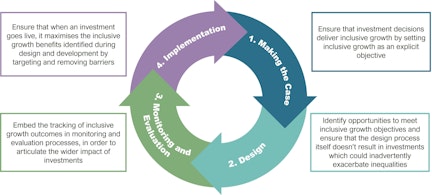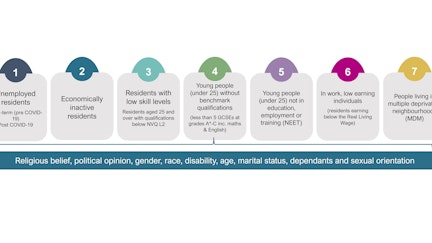Mainstreaming Inclusive Growth: Belfast
Clare Hutchinson, Strategic Policy and Planning Officer at Belfast City Council, blogs on the Inclusive Growth Index, Toolkit and Cohorts

Clare Hutchinson
Strategic Policy and Planning Officer at Belfast City Council

Clare Hutchinson
Strategic Policy and Planning Officer at Belfast City Council

Inclusive growth was a central aspiration in Belfast’s first community plan, the Belfast Agenda, in 2017. Since then we have worked hard to define more clearly what this means for us and to make a difference through a number of positive actions and high levels of commitment from key stakeholders.
But we know that if we are to have more impact, we need to make inclusive growth a mission shared by all. We wanted a set of tools that would encourage all our staff and partners to stop and think how they, in their job and as an employer, could impact inclusive growth and provide the appropriate support to help them do this.
What we did next
1. Inclusive Growth Index: Establishing what inclusive growth means for Belfast
From our work to date we realised that inclusive growth can mean different things to different people. So, we spent time looking at what the specific issues for Belfast were. With the help of the Inclusive Growth Network and their partner Metro Dynamics, we carried out a number of engagement exercises which resulted in us identifying three causes of inequality that prevent people from benefitting from growth in Belfast: Social Mobility, Inclusive Labour Markets and Inclusive Places.

From this we developed an Inclusive Growth Index, which tracks twenty city-wide and neighbourhood level statistics categorised by the three domain areas. Taken together these metrics should indicate whether we are collectively tackling the root causes of inequality and creating the conditions for a more inclusive society. Our aspiration is that this Index will help our officers and partners to determine how they could support a more inclusive approach to growth by focusing their attention on the key issues for Belfast. Importantly it will also provide a tool to understand progress in a way which is accessible to stakeholders, can be jointly owned and which over time should help to inform future policy focus.
2. Inclusive Growth Toolkit: Supporting staff in translating inclusive growth into action
Throughout our conversations we realised that officers and partners were enthusiastic and committed to pursuing inclusive growth, but struggled to translate this from a concept into practical actions which would have a positive impact within the remit of their role. We wanted to provide a structured and accessible tool to support officers – something that would develop a consistency of approach and build capacity.
Our Inclusive Growth Toolkit provides practical guidance for staff to encourage inclusive growth outcomes through all our investments, built around the lifecycle of a project.

This toolkit is about helping officers identify opportunities for delivering more inclusive outcomes right from the outset in planning and importantly setting clear objectives and measures so we can know how we are doing.
In it we ask questions to prompt thinking around what could be done differently at each stage of the project lifecycle to help achieve our inclusive growth objectives based on recognised best practice approaches. We also share practical examples through case studies and signpost to helpful resources, existing initiatives (e.g. Belfast Business Promise and Social Value Procurement Framework) and relevant officers to connect good practice. It is our aspiration that this will provide a recognised best practice approach, shared language and understanding of what could work in practice.
3. Inclusive Growth Cohorts: Identifying target groups
We also took time to target our efforts to those groups of citizens most likely to face greater barriers to good quality employment. This led us to work with our partners at Queens University to identify seven Inclusive Growth Cohorts. These provide us with a clear link between economic policy and interventions and the intended beneficiaries. People living in neighbourhoods of multiple deprivation are also included, recognising that there are social and spatial aspects to inclusive growth.

Plans for the future?
Once we have trialled these tools throughout the Council, we will then share with our Community Planning Partners to identify opportunities to adopt a shared approach.
Feedback from staff throughout our extensive engagement has told us that these tools should not be about adding in complicated reporting mechanisms or adopting a tick box approach. Rather it is about working with staff to build awareness, understanding and confidence in applying and interpreting the tools. Then we will build on the incremental progress and adapt/refine them to make sure they are relevant, user friendly and provide additionality.
We plan to develop and deliver a targeted capacity building programme across the organisation to support these aims alongside identifying opportunities to build specific inclusive growth goals into the departmental planning and budget allocation processes.
The work on the Inclusive Growth Index has been delivered through fully funded IGN implementation advice – bespoke support, tailored to member needs, which helps to unlock projects that deliver inclusive growth.

Mainstreaming Inclusive Growth
Belfast City Council is mainstreaming inclusive growth by embedding it into core organisational practices. For practical steps on how to put inclusive growth at the core of business and decision-making processes, read this IGN report.
IGN Insights
Browse other IGN insights to find what inclusive growth looks like in practice and how it is benefitting people and places across the UK










